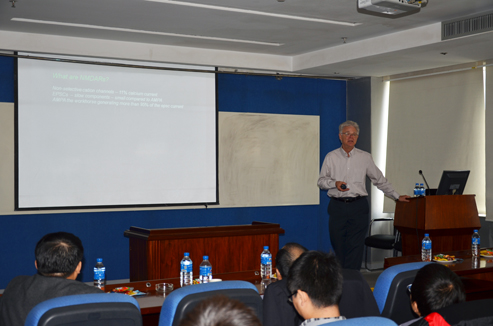Two renowned neuroscientists from the University of Western Ontario, Canada, Dr. John F. MacDonald and Dr. Wei-Yang Lu, visited KIZ and delivered impressive lectures in the morning of Oct. 10th, 2011.
1) Dr. John F. MacDonald’s research focuses the regulation of excitatory synaptic transmission and synaptic plasticity by signal transduction pathways. He is the member of The Academy of Science of the Royal Society of Canada and he also has spent 11 years as a member of MRC and CIHR grant’s committees. Till now, Dr. MacDonald has published over 175 scientific papers and articles, and has trained more than 40 graduate students and post-doctoral trainees. His most cited papers have appeared in many peer-reviewed journals.
In the lecture “Why are there different subtypes of NMDA receptors at CA1 hippocampal synapses?” Dr. MacDonald interpreted the roles of NR2A, NR2B in the plasticity of synapses; the selective interactions between agonists/antagonists and NR2A/NR2B; and the mechanisms of the NMDAR subunits controlling synaptic plasticity.
2) Dr. Wei-Yang Lu’s lab are mainly working on the cellular and molecular mechanisms through which cytokines and trophic factors regulate central synaptic transmission and plasticity under physiological and/or disease conditions. Dr. Lu has delivered the lecture titles “Non-catalytic role of acetylcholinesterease (AChE) in the regulation of glutamatergic synaptic stability”, in which he provided facts, theoretical basics and the hypothesis of the controlling effects of AChE to Neuregulin and Neurexin in neurodevelopment, and the interaction of synaptic function and its’ morphological characteristics. Dr. Lu’s talk also gave us the clue to interpret the outbreak of stroke and schizophrenia.

Dr. John F. MacDonald

Dr. Wei-Yang Lu
